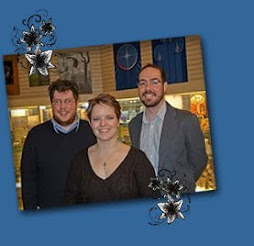I am a theology student from the Anglican Diocese of Ottawa. I have been invited to participate in a three month internship through the Anglican Church of Canada's Theological Students International Intern Program. I am preparing to head to the Episcopal Diocese of Jerusalem and the Middle East in May.
When I initially applied to the program and considered the question of where I would like to be placed, I decided to release myself to the process. I did not request a specific location, but trusted that regardless of where in the Communion I was placed, I would have an opportunity to first and foremost, learn. I hope that by entering into relationship and dialogue, I will become more informed, and therefore, changed through the process.
I was only informed of the prospect of a placement in Jerusalem after my acceptance to the TSIIP. I admit I was, and remain, tremendously excited about the opportunity. I believe serving as a seminarian in the diocese of Jerusalem would offer a number of immediate and invaluable experiences from which I could benefit.
First, I believe there is much I can learn from living in a multi-national, multi-ethnic, and multi-lingual population diocese such as Jerusalem, where Jews, Muslims and Christians co-exist and attempt to foster peace and forge reconciliation. My program of study is Anglican Studies, but I attend a Roman Catholic university. I study with Ukrainian Catholic, Anglican and Orthodox students. Great effort is made among the communities to foster ecumenical awareness and appreciation. Opportunity is available to dialogue and through it, improved understanding of each other’s faith. However, St. Paul’s is a small school. More or less, we are all Christian. We are a fairly close-knit group, which makes it safe to enter such conversations. I am open to having this safety net challenged.
I also recognize the great separation North Americans make between people’s public and private lives. I am rarely publically challenged on the basis of my faith, nor do I face opposition. I find the opportunity to witness how three major world religions function interfaithfully and ecumenically within the Holy Land inspiring and more than a little humbling.
Second, in comparison to North America, in which roughly 85% of the faithful are Christian, the percentage of Christians in Israel is less than five percent. Having an opportunity to worship, serve, and live in a region where I am not a member of the predominant cultural or faith group would be a learning experience in itself. While I recognize this could certainly be a challenge, I also hope it could be an eye opener that forces me to see a world outside my personal perspective.
Thirdly, I cannot ignore the spiritual history of the region. Surely, I can visit the Holy Land at any point I choose. But the chance to spend an extended period in the city to explore historical sites, to be present in the place we believe our Christian story began, to gain a deeper appreciation for the dynamics of both the people and pilgrims, the political conflict and the continued efforts to resolve them and to observe the shape of gender relations is simply an opportunity I could not pass up.
Lastly, I would remark on the issue of gender relations. The fact is, I belong to a Western generation in which I have not had to struggle or fight for my equality in society. Through my discernment and formation process, I have not been faced (at least, not yet), with difficult gender dynamics. No one has openly opposed my pursuit of ordination in the Anglican Church. However, I do not take for granted that I have this ability. I am fully cognisant that not all women in the Church are granted this opportunity. Given the Province of Jerusalem does not yet ordain women, I am encouraged at the diocese’s willingness to openly work with a female seminarian. I am excited to have my presence in the diocese stand as a witness to my personal discernment of a call to ordination.
The only agenda I hope to bring with me to Jerusalem is to bear witness and to learn. That my heart, mind and spirit remain open to the essence of Anglicanism, which is diversity.
Tuesday, February 16, 2010
Subscribe to:
Posts (Atom)

